Jerry Bibuld, chess activist (1928-2013)
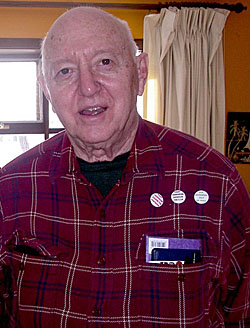
Jerry Bibuld in an undated photo.
Photo courtesy of Jerry Bibuld (Myspace).
Jerry Bibuld, FIDE International Arbiter and longtime chess advocate for the expansion of chess in the African Diaspora has died. Born in the Bronx, New York on June 9th, 1928, the 85-year old had been suffering from the effects of Parkinson’s Disease and succumbed on October 22nd. The chess world is at a great loss.
Jerry was a mainstay in the U.S. chess scene and was a Life Member of the U.S. Chess Federation. Back in February, The Chess Drum did a tribute on the chess works of Jerry and described some of his contributions.
Jerry insisted on informality and did not like to be called “Mr. Bibuld”. If you did so, he would return the formality until you ceased. Another thing he did was insist on using the African version of one’s name. He would call Nigerian master George Umezinwa by “Okechukwu”. He always shared with those whom he trusted and felt were trying to live nobly. He indeed had his own principles and he was firm in his convictions.
If you met Jerry, you would have to go through one of his political orientations where you were exposed to his own unique language. One of the principles he fought for was the right for liberty and equality. He would recount his history and the times he was accosted and jailed for his activism. Jerry took on some unpopular views, but you always knew exactly where he stood.
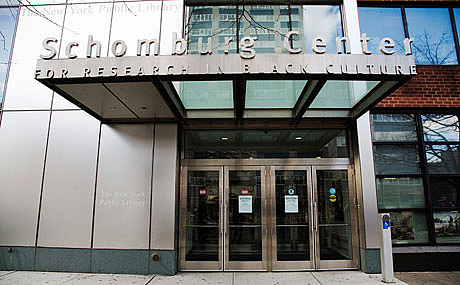
One of Jerry’s favorite beneficiaries of his great works.
As far as chess is concerned, Jerry took more joy in organizing, directing and documenting than playing. He had a 1600 rating (1800 peak) and said with conviction, “The average strength of all chess players is 1500. That means I’m relatively a strong player.” He certainly had a different view and offered many philosophic stances on chess that would make one take another look. Besides his volunteer work in chess, he reveled in documenting chess in all its glory.
One of the most beautiful contributions of Jerry was his stunning photography. He had compiled a huge collection of photographs of different events over the years, but was especially proud of his photographs of players of African descent. He donated countless prints to the Schomburg Center for Research in Black Culture (Harlem, New York) and has been donating them for quite some time. This would be the easiest way for this information to be seen for many years to come.
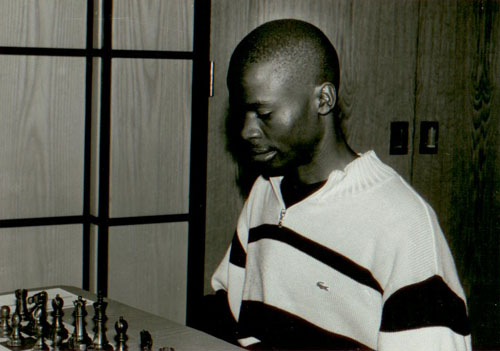
Portrait of Zambia’s (then IM, now GM) Amon Simutowe in 2001.
Photo by Jerry Bibuld.
Jerry was well-respected in the African Diaspora, particularly the federations he adopted… Uganda, Kenya and Mozambique. He would make as a condition for the use of his photographs the sending of magazine subscriptions to the federation. He had been an International Arbiter since 1980 and directed tournaments in these countries to provide them with needed direction in places were there was nary an International Arbiter. He was also instrumental in organizing the historic Wilbert Paige Memorial tournament in Harlem. This tournament featured ten of the top players of African descent and he invited The Chess Drum to be the official website for the tournament.
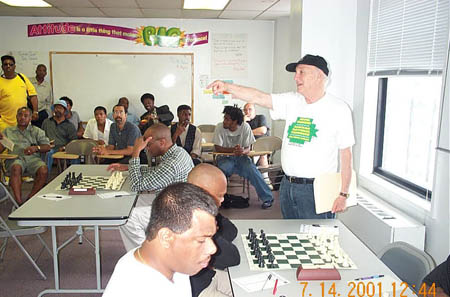
Organizer and Arbiter Jerry Bibuld before the start of the Wilbert Paige Memorial. Three of the competitors shown are the late IM Michael Schleifer (Canada), IM Watu Kobese (South Africa) and the late FM Ronald Simpson (USA). Photo by Daaim Shabazz.
Of course, Jerry had a number of detractors, but it did not seem to faze him. In fact, it gave him more resolve. On a number of listserves, Jerry could be seen debating on USCF and FIDE politics. There was even a discussion on the merits of Jerry’s list of “Afro-American” players. It was an interesting gesture for someone outside this community to take such of an interest and many found it a bit odd. However, he was appreciated by the community to which he gave so much and that was enough for him.
“Dr. Shabazz has made a dream of mine come true by setting up this website.”
~Jerry Bibuld (13 February 2001)
In 2001, Jerry was excited at the launching of a new website called “The Chess Drum” (launched 12 February 2001). It was a website highlighting the accomplishment of players of African descent worldwide. He moved to support the effort primarily through his photography. Years earlier he had shared his historic list of Afro-American masters to those whom he trusted as being genuine about the advancement of chess within this demographic segment.
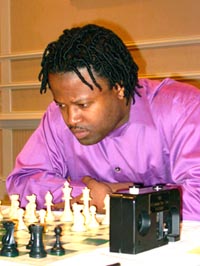
A classic of Maurice Ashley.
Photo by Jerry Bibuld.
This valuable list provided the year the player earned the National Master title, their current ratings and their peak rating (Note: Maurice Ashley had reached 2606 USCF and there were other high flyers on the list). He used this list as a showcase of talent and a validation that players of African descent could excel. Chess became the ultimate stereotype buster for him.
The list became one of the resources for the “Drum Majors” list which also included players from around the world. While he did not play a direct role in the creation of the website, he certainly took pride in the fact that there was a voice for players of African ancestry.
Apart from chess Jerry was an intriguing figure. According to an obituary in Black News, he enlisted in the Army in 1946 just after World War II. After his discharge, he worked for on the 1949 campaign for New York City Councilman Benjamin Davis, “an Afro-American communist from Harlem”. It was at this time he met his first wife, Elaine Jones through mutual friend Oliver Leeds. They produced four children named Douglass, Carrington, Melanie and Sarah. The Bibuld family received death threats from the National Grand Dragon of the Ku Klux Klan since they were an interracial family.
Back in 2007, Bibuld wrote a sort of an autobiographical piece that he made public. It revealed some interesting tidbits about his philosophy, lifestyle and interests.
I am, on this date (17 November 2007) a 79-year-old United Statesian male, a husband, father, grandfather and, most fortunately, great grandfather. The best and most important part of my life is my family. Although born and bred in the United States of America – and living in CT – I consider myself an immigrant into Afro-America, essentially because all of my family, except my two brothers, is Afro-American. It is my belief that Afro-America is a colony of the United States. When it becomes a sovereign state — if I live that long — I shall apply for citizenship in Afro-America. I have hopes that citizenship will be granted me, because of the status of my immediate family and in recognition of services rendered the nation.
I have been active intellectually all my life, especially in chess and in struggles for human rights, which, in the United States, essentially was subsumed into the “civil rights movement”, especially in the 1950s, 1960s and early 1970s. In my later years, I became an active photographer. At one time, I was the best known “chess photographer” in the United States. I have maintained throughout my life an active interest in classical music – especially the opera – the theater and literature, with relatively minor interests in poetry and motion pictures.
Last January, I enrolled as an undergraduate student at Western Connecticut State University. At first, I was going to study only Spanish and Portuguese, because Danbury is a hub of Hispanic/Latino and Brazilian/Portuguese populations, but my Love Woman suggested that, as long as I was going back to school, I go after the baccalaureate. So I wrote to NYU, which had kicked me out in 1952, for a transmittal. Not only did NYU comply with my request, but it actually wrote something like “student left in good standing”.
Now, I hope to get a BA in May 2010, but I’m taking it slow and easy. (One thing I note is that there is much more reading involved than I remember back in the early 1950s.) I was kicked out of NYU because I was considered a loose cannon. Many persons who know me consider that I still am a loose cannon, although I am older and less volatile today. Socio-politically, I am more radical, I believe, than I was in 1952.
Who I’d like to meet: Noam Chomsky, Howard Zinn, Hugo Chavez, Amy Goodman
In another 2008 autobiographical piece titled, “Towards and Autobiographical Dissertation,” he wrote about his views of (then candidate) Barack Obama. His political views were leftist and he wasted little time excoriating the militaristic policies of the U.S. and what he calls the Afro-American colony. While his 1950s and 1960s battles for human equality via the Brooklyn branch of CORE (Congress of Racial Equality) were well known, Jerry took on other fights.
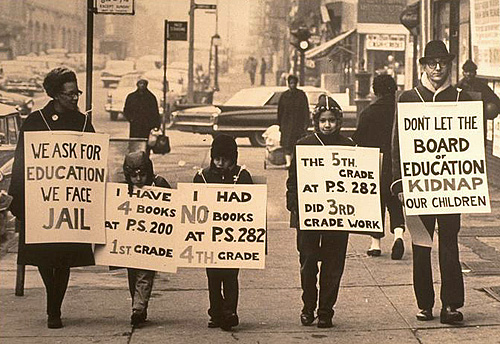
The Bibuld Family picketing for desegregation during a 1962 protest. Jerry and wife Elain were disgusted by the condition of the schools their children were in. Photo by Bob Adelman (Brooklyn Congress of Racial Equality – CORE), Brooklyn Historical Society.
He campaigned against the apartheid regime of South Africa when it was not a popular thing to do. In addition, he campaigned to punish those athletes competing for South Africa and getting them banned from international chess competitions. He compiled a list of 38 South African apartheid-era tennis players and once proposed an 11:00am protest at the 1990 U.S. Open Tennis Championships in Flushing Meadows, New York against their participation.
“The racism and the male supremacy of the society in which I live are the most important matters of principle in my life. I try to live by pro-human principles. This means that I must fight racism and male supremacy continually because I am a United Statesian and a male in an imperial society.”
~Jerry Bibuld
He also took the apartheid fight to FIDE and rallied support of constituents in the General Sessions. According to Nick Barnett,
South African chess was split down the middle. The SA Chess Federation went along with the apartheid government while the SA Council on Sport (SACOS) whose motto was “No normal sport in an abnormal society” excluded itself from all existing sporting bodies. Its members were not even supposed to watch sport on TV. CAPSA (Chess Association for the People of South Africa) was affiliated to SACOS.
he added…
The two existing bodies, the SACF and CAPSA were not on speaking terms. The former wanted things to go on as usual with some concessions, while CAPSA demanded a moratorium on all overseas contact. As SACOS we eventually brought about reconciliation and contacted Fidé. I was delegated to draft the letter to Casta Abundo a Filipino, Fidé General Secretary, who I got to know when I worked in Manila in 1967. Fidé appointed a CACDEC (Committee for Assistance to Chess Developing Countries) troika headed by Nigerian lawyer, Emanual Omuku with US anti-apartheid activist, Jerome Bibold, and John Warnock president of the US Virgin Islands federation. It took weeks of hard negotiations before Omuku demanded a conclusion and Chessa was born. (full entry)
Thus, Jerry was successful in helping to get the South African Chess Federation (SACF) banned and to later abolish apartheid policies. SACF contended that CAPSA (mostly from predominately-Black Cape province) had no players strong enough to be integrated into the national team. Deon Solomons was the perennial champion of CAPSA and its Vice President in 1992 when CAPSA became part of Chess South Africa (CHESSA). Then vindication occurred!
Solomons became the first champion of the newly-formed non-apartheid CHESSA, thereby confounding many apartheidists, who had claimed that CAPSA did not have players as strong as the apartheid government-sponsored South African Chess Federation, which also had been subsumed into CHESSA.
In 1992, South Africa was reinstated. Jerry was CAPSA’s first life member. His reputation followed and he became endeared by the African continent. It was then that he began to take on another mission of helping African federations to join the world’s chess landscape. He adopted three federations (Uganda, Kenya and Mozambique), but directed tournaments in several countries to help them gain momentum as new federations. He was bestowed Life Memberships in both the Ugandan Chess Federation and Jamaican Chess Federation.
.jpg)
.jpg)
.jpg)

.jpg)
.jpg)
(L-R): Louis Smith and Sherman Maduro playing for Dutch Antilles at 1996 Olympiad in Yerevan, Armenia… Ugandan (men) at 2002 Olympiad in Bled, Slovenia… Angola (men) at 2002 Olympiad; Botswana (women) at 2002 Olympiad… Jamaica (women) at 2002 Olympiad… Nigeria (women) at 2002 Olympiad. Photos by Jerry Bibuld.
This was Jerry’s legacy. He did not want to be soothed or appeased, nor did he appreciate condescension. He did not treat anyone with pity, but tried to instill dignity. He was a straight-laced person fighting for principle and in doing so, gained many friends… and some enemies. Such is life. Memories of Jerry will show both his hard side and his soft side… which he showed to those closest to him. He had a beautiful spirit.
Services will be held 3:00pm on Saturday, November 9th
Frank R. Bell Funeral Home
536 Sterling Place, Brooklyn, New York 11238
(718) 399-2500

An irreplaceable loss! RIP. Exceptional accolade Daaim!
Daaim,
Thank you, am soo touched with Jerome Bibuld stories.
Jerry rest in peace
Rgds
FA Isaac Babu
Super obituary, Daaim. You’ve really outdone yourself. Jerry directed every tournament I ever sponsored, and did an outstanding job with great integrity. I regret that I haven’t been able to play more, but vicariously through Jerry’s efforts, I’ve enjoyed the success of many brilliant and talented players from Africa and the African Diaspora.
Daaim,
Thank you for this fabulous piece.
I was saddened by the news initially but then decided to “fight the feelings”, cheer up and celebrate his life instead.
On behalf of the Council and wider membership of the Jamaican Chess Federation I would like to extend condolences to his family, friends and the wider chess community. Jerry was an amazing man.
I met him at the Olympiad in Bled, Slovenia in 2002 and remember vividly that cold day in October when he took that picture (above) of me with the Jamaican women’s team. I can attest to his desire to use the local language. Being a language buff myself I enjoyed comparing notes with him as we both delved into dictionaries to check expressions etc. To this day I remember “dober dan” (good morning) that we used to say when we greeted each other in Bled.
I last saw, and spoke with, him at the Maurice Ashley-organized HB Global event in Minneapolis in 2005. Subsequently, we kept in touch via email.
A true gentleman, a fighter for human rights (especially re people of African extraction), an irrepressible chess aficionado and a veritable colossus has made his transition. May his soul rest in peace and that divine, perpetual light shine on him.
From Chess South Africa (CHESSA)…
In memory of International Arbiter Jerome Bibuld
By Advocate Lyndon Bouah
It was with great sadness that I learnt of the passing of International Arbiter Jerome Bibuld.
Mr. Bibuld’s name will always be remembered for the work he did for non- racial chess in South Africa and internationally. During the dark days of apartheid Mr. Bibuld agreed to be the patron of the South African Chess Association (SACA) and later the Chess association for the people of South Africa ( CAPSA).
His association started off around the mid 1970’s with Africa. He was opposed to racism in the world and apartheid in particular. Mr Andre van Reenen then wrote to him and a lifelong association started. Jerome then started to represent black South African chess at FIDE. The SA Chess Federation had been suspended by Fide in 1974 and despite efforts from various parties to get Fide to lift the ban, Jerome continued steadfastly to oppose the lifting of the ban until freedom had been secured in South Africa for all.
I met the legendary Jerome for the first time in 1992 in the Philippines at the Olympiad when SA was allowed back in international chess. He turned out to be an interesting man with many ideas. In 1994 we met again in Moscow and this time he insisted on taking us to the Bolshoi Theatre in Moscow. As someone who had never been to theatre (because we were not allowed to go there in SA in the 1980’s) this was an indeed an experience. We watched the world famous Swan Lake being performed. I recall that GM Speelman also attending. For a young man of 21 the experience was quite an eye opener.
At the Olympiad in Armenia in 1996 Jerome took us to see La Verdi at the Opera House in Yerevan. I didn’t appreciate it at first but got to understand the culture of opera only later. That experience stayed with me for the rest of my life. What Jerome was doing for us was showing us culture and giving us lessons in life. I did not understand this but later on in life I understood that he was educating me culturally. Today I am fortunate to visit the theatre at least once every two months.
In 2001 Jerome organised a major chess event in New York, the Wilbert Paige Memorial and invited IM Kenny Solomon and IM Watu Kobese to compete in the event. This was a fantastic opportunity for them and I do believe that this exposure assisted both Kenny and Watu to become the legendary South African chess champions they are.
Cape Town in the last few years has hosted a few South African Open championships. In 2004 The World Amateur and SA championship was held in Cape Town. I invited ,as WP president at the time, IA Jerome Bibuld to be the arbiter for the event. He enjoyed the time with us immensely and he also brought his sons.
Many South Africans shared meals at his home and at various Olympiads. He always had a kind word for everyone and always enquired how everyone back home was. He loved taking photographs and I remember fondly him often coaxing us to take photos so that we could cherish the memories and opportunities we had been presented with.
To Jerome Bibuld, a true soldier for chess he lived the values of Gens Una Sumus. You will always be remembered for the principled stance that you took on our behalf. Your legacy lives on around the African continent for the development work you did amongst all African countries. Your guidance as a senior statesman will always be appreciated. Your name will reverberate from Cairo to Cape Town, from Morocco to Mozambique, from Kenya to Namibia, from Uganda to Nigeria. Your selfless dedication on behalf of chessplayers from the African continent will always be remembered.
Hambla Kahle ( Go in peace) my friend Jerome Bibuld.
We will carry on your work and make sure that the world does indeed become a better place for all!
Your friend,
Candidate Master Advocate Lyndon Bouah
Chief Director for Sport and Recreation
Western Cape Provincial Government
November 2013
Lyndon,
Well said! Perhaps the relevant authorities in South Africa (and indeed the continent) can put in place plans to commemorate his legacy by naming an event after him etc. (as long as he was not opposed to such an honour). Let us keep in touch!
It’s unfortunate Mr. Bibuld has passed. His contributions to the chess community were numerous. I was one of the players who benefited from his contributions. He lobbied for my participation at the Polgar invitation tournament in 2001 and the 2003 Generations tournament.
I enjoyed the conversations I had with him. By the end of the first week of meeting him, I gave him a nickname “old legend”. I wish the world could have more people like him.
Jerry was a great guy. It’s so long ago that I met him that I’ve forgotten, but I think one of the old Olympiads back in the ’70s.
Fantastic photographer always. I don’t recall him ever without his camera, think he slept with it.
His contribution to life was enormous. There aren’t many like him.
I wish his family all the best at this sad time.
I never had the pleasure of meeting Mr Bibuld in person, but certainly knew of him by reputation. Thanks Daaim for publishing such a thorough obituary, and likewise to all of the commenters who shared their memories of Jerry. The chess world has lost someone who did things that we all have benefited from, and the world has lost someone who proves that one motivated person can indeed make a difference.
One motivated person can do a lot for chess RJT! Right-on brother! We need many! RIP Jerry.
Mr Jerome Bibuld was an activist that most definitely left his mark on all of us in the chess world.I remember him cheerful and being extremely kind! I met him in 2001.He arrranged for my particapation in the Wilbert Paige Memorial and World Open in 2001,and my trip From Capetown to Newyork. I along with Grace Nsubiga from Uganda stayed with his lovely family.Mr Bibuld was a great host,his hospitality is unforgettable.Hetook us sight seeing around Newyork and always checked to ensure we were comfortable.He always expressed his views on the chess politics but I never found him imposing.He was simply pursuing justice in the chess world and making a difference.
I herewith celebrate the life of a selfless doyen to the movement of chess emancipation worldwide! A true comrade of Chess in need of a Che Guavara. I firmly believe that his sacrificial intrusions in many instances of chess injustices, from country level to individuals perspectives, some of which he elaborately shared with me in our several interactions, paved the way for the countless prevalent correctness and fairness. Above all it shall remain a legacy of a life worthy of being lived, to me as I sometimes wish to throw down the gauntlet.
I will miss his humor, above all I will miss his friendship.
RIP dear “old friend” Aluta continuata. Yours was a life worthy of a BLESSING!
A belated sincere sorrow to your beloved family.
As Jerry Bibuld’s oldest child, I am moved by your memorial tribute and the many responses to it. I had printed out your February remembrance article and read it to him. He was moved by it and had planned a response, but was never able to compose one due to his illness. I will be sending this article out to all his children and grandchildren. Thank you very much. Knowing that memory of him is alive throughout the world is a great comfort and source of tremendous pride in our relation to him.
Hello, I am Jerry’s eldest daughter. I am so happy and proud of your written recognition of my father’s great work. He was the greatest warrior for humanity that I have ever known and he was the same at home as he was when away. Human dignity & freedom were his measure of all things. I know that chess was his greatest social activity. Yet when faced with anti-human conditions; his joy of life, combined with his love of humanity forged my father into a great force to be reckoned with. I work and pray to live up to his example. Thank you all for your kind condolences.
Visit http://www.theyearofrestoration.org to learn more about the path my father placed me upon, to work to restore the Pan-African World.
daaim,
jerry and i got together on his request for chess magazines
to be sent to african countries. i met jerry at the foxwoods
tournament and gave him bundles of chess horizons,
the massachusetts chess periodical.
after that meeting i was able to continue providing chess
magazines via his son douglass, who lived in newton mass.,
very convenient for me.
steve frymer
lexington mass
I recall meeting Jerry in the early 90s at a tournament right outside Buffalo , maybe Albany, i recall winninh vs Daniel Rensch in that event, kinda funny that i play on his site, chess.com!!! HAHAHA. Well, Jerry saw i was a master and he began questioning and showing other masters around the world i didnt realize existed! I recall it being a very motivating time and its good to have met him cuz it gave me greater strength and inspiration along the way to ULTRAMODERNISM. Actually im at the Buffalo Public Library right now gettin ready to log into chess.com and have some fun with Rensch and the guys if u log in stop by with ur titles and ratings and we can practice the 1-minute stuff together!!!
Interesting personality.